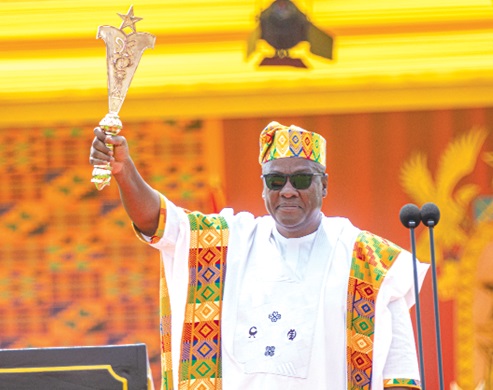National debate erupted recently following revelations that President John Mahama, Vice-President Prof. Naana Jane Opoku-Agyemang and the Speaker of Parliament, Alban Bagbin, were all absent from the country simultaneously.
The Minority in Parliament quickly raised the alarm, describing the situation as a “constitutional crisis” and questioning who was effectively in charge of the country during this period of simultaneous absence.
Headlines such as “President, Veep, Speaker All Gone; Who Was in Charge?” sparked widespread public speculation and concern.
Was Ghana left rudderless? Should the Chief Justice or another public official have stepped in to assume presidential responsibilities?
Could this incident expose a dangerous gap in the 1992 Constitution that needs urgent redress?
These are valid concerns in any vibrant democracy but they also demand a sober reading of the Constitution and the facts at hand.
While the Minority’s concerns may be rooted in legitimate oversight, constitutional experts argue that the perceived crisis was more political than legal.
What the Constitution says
Ghana’s 1992 Constitution is far from ambiguous on matters of presidential succession and temporary absence.
Article 59 makes it clear that the President may leave Ghana only after notifying the Speaker of Parliament in writing.
This is the first safeguard to ensure that government continuity is not disrupted.
Article 60(8) then states, “Whenever the President is absent from Ghana or is for any other reason unable to perform the functions of his office, the Vice-President shall perform the functions of the President until the President returns or can perform his functions.”
The Vice- President thus assumes responsibility in the President’s absence without requiring a fresh oath—unless the President has died, resigned or been removed from office.
In the rare scenario where both the President and Vice-President are unable to perform their duties—whether due to absence or incapacity—Article 60(11) comes into play:
“The Speaker of Parliament shall perform those functions until the President or the Vice-President is able to perform those functions or a new President assumes office.”
Crucially, the Constitution does not extend this power to any other official.
The idea floated by some commentators that the Chief Justice—or even the Administrator General—could step in is constitutionally unfounded.
Article 60(12) reinforces that only the Speaker, upon taking the presidential oath, may act in the absence of both the President and Vice-President.
Furthermore, the exclusion of the Chief Justice from this chain of succession is deliberate.
The Judiciary is meant to remain independent and free from executive responsibilities.
This clear separation of powers is central to the checks and balances of Ghana’s democratic framework.
Lessons from the past
Historical precedents also shed light on how similar situations have been handled. During former President Rawlings’ administration, tensions with then Vice-President Arkaah led the President to avoid travelling altogether for a period to avert any uncertainty in executive authority.
Under President Nana Akufo-Addo, it was reported that he postponed a foreign trip until the Speaker, Mike Oquaye, returned to Ghana and could be sworn in to act.
These examples underline the importance of coordination among top state officials.
Indeed, the Office of the Chief of Staff and the Speaker’s Secretariat must ensure that at least one of the three constitutional successors remains in the country at all times.
The Constitution expects such foresight and cooperation.
No legal vacuum—but operational coordination needed
The recent incident, while politically charged, is not due to a constitutional crisis.
Rather, it reveals the need for improved administrative coordination and perhaps a review of protocols surrounding official travel.
The Constitution already anticipates the temporary absence of the President and provides clear guidance on succession.
What appears to have caused public concern is a lapse in communication or coordination, not a flaw in the law itself.
It is also worth noting that, in this digital age, the idea that a President cannot perform any functions while abroad may be outdated.
Ghanaian constitutional experts could explore the possibility of enabling limited presidential duties to be discharged from Ghanaian embassies during short official trips.
This would require clear legal parameters, but it reflects a modern reality: heads of state often govern from afar during international engagements.
A constitutional gap or a storm in a teacup?
Calls for reform should not be dismissed outright. Ghana is currently reviewing the 1992 Constitution and such debates offer an opportunity to consider whether practical updates are needed.
However, it is equally important to avoid politicising what is fundamentally a matter of administrative coordination.
In this case, there was no real constitutional ambiguity or constitutional gap and no crisis. Going forward, better planning and communication among the President, Vice-President and Speaker’s offices are needed to avoid simultaneous absences.
The Constitution provides the framework; the onus is on those entrusted with public office to operate within it responsibly.
As the dust settles, Ghanaians can be reassured that their Constitution has not failed them. But their leaders must ensure it is respected—not just in letter, but in spirit.
The writer is a political scientist

